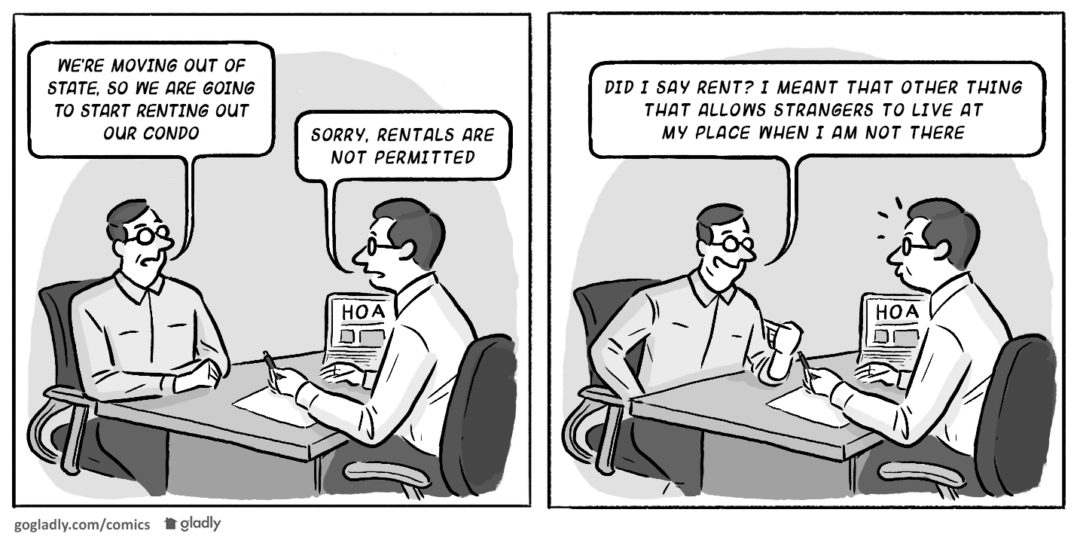Vacation rentals are booming, and HOAs are struggling to keep up with the impact on the communities that they govern. Vacation rentals are a lucrative business. From 2015 to 2016, Airbnb doubled revenue, with an estimated $12.3 billion in reservations.1 HomeAway (VRBO) has also had huge growth with an estimated $14-$16 billion in vacation rental bookings in 2015. With this tremendous growth, it’s clear that short-term rentals are not going away anytime soon.
HOA members who market their homes as a short-term or vacation rentals, celebrate the lucrative opportunity and often market the HOA’s amenities to attract tenants. On the flip side, full-time HOA residents often complain that short-term renters are noisy, careless, messy, apathetic to HOA rules, and hard on the common areas. These contrasting perspectives are a perfect recipe for conflict.
In the last two years, our law office has noted a sharp increase in the number of disputes concerning short-term rentals. Having represented both HOAs and landlords in these disputes, I appreciate the opposing viewpoints. Here are a few things for HOAs to consider when grappling with this emerging challenge.
Create Clarity in Governing Documents
If your HOA has not yet adopted and implemented a policy concerning short-term rentals, don’t delay; otherwise, it could be too late.
I recently represented a homeowner who had rented his cabin near a popular recreational lake and state park. The HOA’s CC&Rs were drafted in the early 70’s and included no express rental restriction. When the HOA became fed up with the vacationers who rented the cabin for a few nights or weeks at a time, the HOA decided to take action.
Rather than amending the CC&Rs, which would require the written consent of hundreds of homeowners, the HOA got creative and adopted rules to interpret antiquated CC&R provisions regarding “commercial use” to encompass short-term rentals. In other words, the HOA took the position that short-term rentals constitute a “commercial use” and therefore prohibited them by imposing a hefty fine of $1,000.00 per night.
The cabin owner was assessed a hefty fine. As a result, he filed a lawsuit which lasted more than two years and cost each side tens of thousands of dollars in legal fees. The lengthy litigation was due in part by the difficulty of proving that a rental is a commercial enterprise.2 As one court put it, if the purpose of the vacation rental was for the renters to “relax, eat, sleep, bath, and engage in other incidental activities” that rental did not amount to commercial use.3
The lesson here is that short-term rental rules should be clearly articulated restrictive covenant recorded against the lots. Enforcing short-term rental restriction based on a policy or resolution may not be enough to keep you out of court.
Beware the End-Around
Other HOAs that I represent have lamented that enforcing short-term rental restrictions is difficult because landlords are crafty in evading the HOA’s restriction. Examples of such illusive techniques include:
- Characterizing renters as “guests”, “visitors” or “friends and family members”
- Entering long-term lease agreements, with an early termination clause for a nominal penalty ($5-$10)
- Instead of paying money for the rental, the parties exchange services “off the books”
With these crafty landlords, HOAs must get creative as well. For example, an HOA might consider penalizing the advertisement of short-term rentals in addition to the rental itself. An advertisement can be easily monitored and documented. Or, the HOA may consider restricting early termination provisions in lease agreements within their community.
Consider Embracing Short-Term Rentals and Instead Enforce Behavioral Violations
HOAs will continue to struggle to stay ahead of the creative and elusive landlord. Accordingly, HOAs may consider embracing this emerging market trend and instead focus their efforts on regulating the harmful conduct and behavior that may accompany short-term rentals.
For example, if an HOA finds that short-term renters are noisy or violate parking rules, the HOA may impose a fine against the landlord-owner for its tenant’s violations. This will encourage landlords to properly educate their renters and to be careful in selecting responsible rental guests. Such fines will need to be sufficiently steep to deter the wrongful behavior.
Additionally, it enables the HOA to uphold its restrictions regardless of whether renters are characterized as “guests” or “visitors”. By focusing on the behavior, rather than the act of renting, the HOA takes an active role in ensuring the quality of life in the community.
Takeways
- Establish clear and enforceable governing provisions related to short-term rentals;
- Review the laws and cases in your jurisdiction to ensure that any rental restriction complies with state law;
- Get creative in monitoring and documenting illusive rental practices;
- Focus on the harmful behavior surrounding short-term rentals in addition to the act of renting;
- Vacation Rentals in Your HOA - September 25, 2017
- Solar & HOAs — Who Has The Power? - June 15, 2016
- Is Construction Defect Litigation All It’s Cracked Up to Be? - November 3, 2015



 Help
Help
I always like having the main CC&R’s give strong powers to the Board regarding Rules & Regulations, and then using the R&R to get into the details. That way you aren’t constantly rewriting the main governing docs, but just adopting new R&R or an amendment when changes occur because as you state in your article, things are changing rapidly! I love you guys at Miller Harrison! Great article!
But is this http://garagedoorsacramentoca.net/hoa-open-garage-door/ the way to solve these problems?